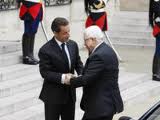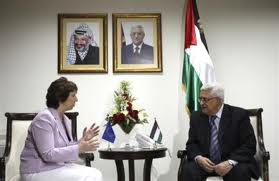 This week, the ballet of heads of state and government will open up at the United Nations headquarter in New York. This year, tensions are a little higher than the previous ones for one reason: Palestine. The Palestinian Authority will be seeking for a change of status within the UN. One of the major concerns from the members of the Euro-Atlantic community is that it could affect any future peaceful outcomes for a solution to the Palestinian-Israeli impasse, while showing division within the European Union and in the transatlantic relations.
This week, the ballet of heads of state and government will open up at the United Nations headquarter in New York. This year, tensions are a little higher than the previous ones for one reason: Palestine. The Palestinian Authority will be seeking for a change of status within the UN. One of the major concerns from the members of the Euro-Atlantic community is that it could affect any future peaceful outcomes for a solution to the Palestinian-Israeli impasse, while showing division within the European Union and in the transatlantic relations.
The Israeli-Palestinian dilemma has been at the core of international relations since the late 1940s. However, in recent years, the tensions in the region as well as the balance of power has shifted for a number of reasons: abandon of the negotiations between Israel and Palestine last year; the sudden changing of the political spectrum in Libya, Tunisia, Egypt, and perhaps Syria; the flotilla incident creating a new Turkish policy, more radical, towards Israel. Any decision at the UN could have considerable consequences on the future of the Palestinian-Israeli negotiations, alienating either the Palestinian Authority or Israel according to the outcome in New York, and eventually affecting the relations between Western powers and Arab states.
Palestine is seeking for an upgrade of its status within the UN from being an observer to a full member. However, many expect to see an adjustment in Palestine’s demand to become instead a ‘non-member state’ like the Vatican. Historically, the US has been one of the main sponsors of Israel for political, cultural and strategic reasons. The US will most likely vote against the Palestinian bid and has even threatened to use its veto power to block any negotiation on the matter. In case of US veto, the Palestinian Authority can take the matter for a vote in the UN General Assembly that could grant it a status of ‘non-member observer state.’ Such change of status to ‘non-member’ would allow the Palestinian Authority to take cases to the International Court of Justice and International Criminal Court.
On the other side of the pond, the European Union is also considerably divided. Germany, the Netherlands, and Czech Republic have historically been pro-Israeli, while, France, Ireland and Sweden tend to be more pro-Palestinian. Unless, Member States agree on one approach, the Union could end up divided into three groups: the one in favor of a Palestinian bid; the other against the bid; and a third group abstaining. In a recent article published in the New York Times, former High Representative, Javier Solana, and former President of Finland, Martti Ahtisaari, argued that it is in the interests of the EU to vote ‘yes’ for ten reasons. Solana and Ahtisaari underlined that a ‘yes’ vote is not incompatible with a two-state solution, as it would keep the Middle East peace alive. Thus, their 11th reason for a ‘yes’ vote is simply to show the world that the Europeans are finally able to play a coherent role as a global actor.
Back in Spring 2011, French President Nicolas Sarkozy met with Palestinian President Mahmoud Abbas in Paris to discuss the Palestinian bid for statehood. Hael Fahoum, the Palestinian ambassador in Paris declared that “France is extremely positive about the importance of establishing the state of Palestine. They don’t have any problem with the recognition issue, but they’re looking to push the whole process towards concrete steps.” Such position from France, one of the powerhouses of the EU, could undermine the Union’s unity.
statehood. Hael Fahoum, the Palestinian ambassador in Paris declared that “France is extremely positive about the importance of establishing the state of Palestine. They don’t have any problem with the recognition issue, but they’re looking to push the whole process towards concrete steps.” Such position from France, one of the powerhouses of the EU, could undermine the Union’s unity.
In such climax and political tension, the role of the High Representative, Ms. Ashton, is central and more important than ever. Ashton’s role has considerably increased recently as she has been part of the Quartet – composed of the US, UN, EU and Russia and led by special envoy Tony Blair – in dealing with the Israeli-Palestinian negotiations. Following her tour in the region last week, HR Ashton declared after her address before the Arab League Peace Initiative Follow-up Committee on September 12, that “at a time when the whole world is focusing on this issue, the EU remains strongly committed to achieving the two-state solution, with the State of Israel and the State of Palestine living side by side in peace and security. The only way to do that is through negotiations.” The EU is an important actor of the Quartet, as it has been the biggest world donor to the Palestinian Authority, with around $500 million per year. Solana’s number is much higher as he argues that in fact the EU has been investing € 1 billion in aid to help build a functioning Palestinian state.
Another important component of Ashton’s job is to maintain stable transatlantic relations. Prior to the summer, the US, during Obama’s tour of Europe, sought to limit European recognition of Palestine. “The [Obama] administration is deeply concerned that European leaders may decide to support the unilateral Palestinian bid for recognition, a step that would isolate Israel and embarrass its most powerful ally, the United States.” However, a year ago before the UNGA, US President Obama declared that the US was favorable to the construction of a Palestinian state. The gap between such statement and the actual US position is creating a real dilemma for US foreign policy. The credibility of the US as a member of the Quartet but also vis-à-vis Arab states could be considerably damaged.
 The Palestinian question is a serious test to the European External Action Service (EEAS) and HR Ashton. Ms. Ashton’s job must be to maintain unity among the 27 Member States, even if it leads to a short-term status-quo on the question. Since her appointment in 2009, HR Ashton has been under a wave of vendetta because of her lack of leadership. But this could change with a managed situation around this contentious question. As argued by Chaffin and Spiegel, Ashton could be playing for the increasing her credentials as HR. Especially with a declining US credibility, the EU could seize this critical moment in order to increase its leverage in the region.
The Palestinian question is a serious test to the European External Action Service (EEAS) and HR Ashton. Ms. Ashton’s job must be to maintain unity among the 27 Member States, even if it leads to a short-term status-quo on the question. Since her appointment in 2009, HR Ashton has been under a wave of vendetta because of her lack of leadership. But this could change with a managed situation around this contentious question. As argued by Chaffin and Spiegel, Ashton could be playing for the increasing her credentials as HR. Especially with a declining US credibility, the EU could seize this critical moment in order to increase its leverage in the region.
HR Ashton’s primary responsibilities are multiple: first, keep interacting with Palestine and Israel, as she has been doing since appointed. Second, Ashton must maintain communication and coordination with not only the Big 3 – France, the UK, and Germany – but the other 24 in order to keep unity within the Union. Third, in case of a status-quo, which would mean a non-pronouncement on the question, Ashton needs a game-plan for the aftermaths. As underlined by an European diplomat, “Five years ago, we didn’t really have a role to play. The fact that we are so worried about splitting suggests we are getting more accustomed to being unified.” This could be one way to look at it! But the relevance of the EEAS is clearly at stake.